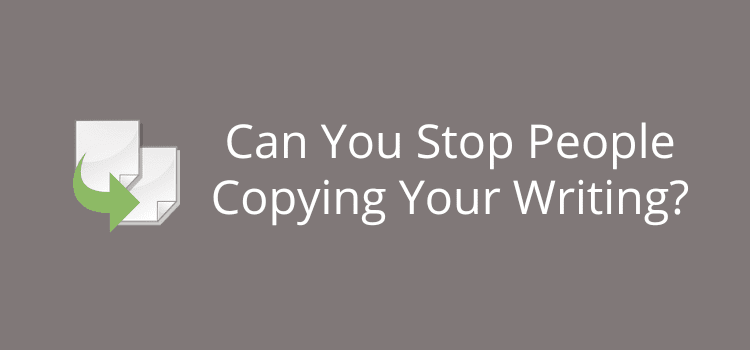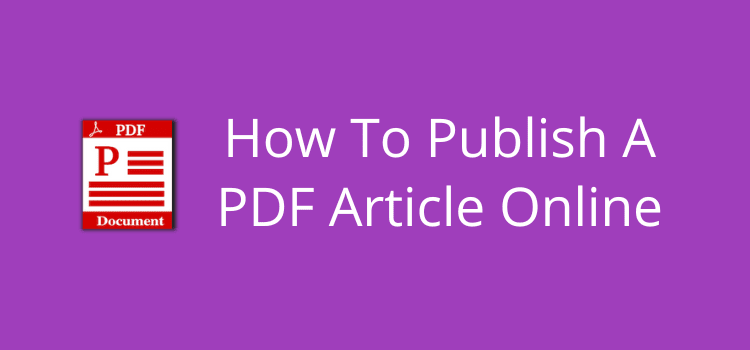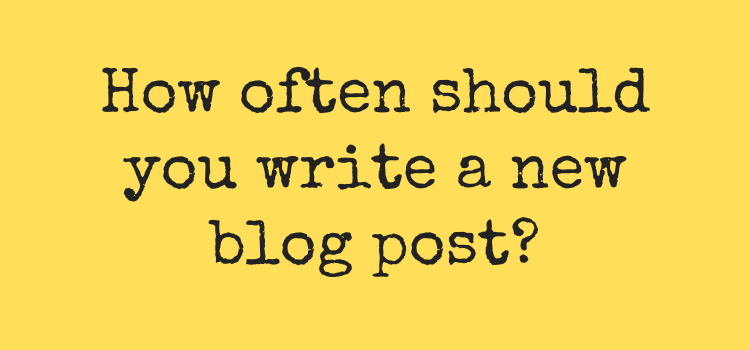
The thought of people copying your writing without your approval is annoying for any writer. You spent hours researching, drafting, and editing your work, wanting to share something valuable and unique with your readers.
But the reality of online publishing makes it almost impossible to prevent copying of your articles, blog posts, images, or even ebooks.
Once you publish any form of digital content, it’s easy for anyone to copy and share it with a single click. So much so that Google claims that about 60% of the Internet is duplicate content.
What can you do to prevent or at least reduce the risk of people copying and republishing your writing? Here are some ideas to help you.
What can you do about people copying your writing?
Yes, you can try to minimize the risk of someone copying your work, but nothing will be 100% effective.
I’m sure you have a copyright notice on your website or blog and a copyright page in your books and ebooks.
However, relying on copyright to protect your writing will not help because laws differ from country to country.
Taking legal action for copyright infringement is time-consuming, extremely expensive, and with no guarantee of a positive outcome.
Plagiarism tools can be somewhat effective if you want to check if your writing has been republished.
However, tools like these are far from perfect and may only detect some instances of copyright infringement of your writing.
If you discover someone republishing your content, you can contact the site owner to inform them of your copyright and ask them to remove your content.
It’s not always writing because I had one experience with someone using my site’s logo.
Happily, they removed my logo from their site after I contacted them.
People often don’t realize that copying is wrong, so contacting them can sometimes solve the problem.
Tools to prevent copying
Most publishing services add Digital Rights Management (DRM) if you publish ebooks.
It has pros and cons.
But it effectively stops easy copying or duplicating your ebooks.
However, it is relatively simple for people with some technical ability to strip an ebook of DRM and create copies. Ebook piracy is rampant, and especially for free PDF ebooks.
You can add CSS code to websites and blogs to prevent visitors from selecting, copying, and pasting your text.
While it works for most visitors, people can still access your site code and copy from there.
But there is one downside to this approach.
Regular site visitors won’t be able to copy snippets or quotes from your content to share on their blog or social media.
Watermarking can identify the original creator for images and PDF documents.
These are usually transparent images, or text added to an image or document.
But again, it is not a foolproof method.
Watermarks are pretty easy to remove for someone with the appropriate software.
Whatever methods you use will help reduce the risk of people copying your writing, images, or documents.
But you can’t prevent it entirely because writing online is always insecure.
Looking at the positive side
Copying is not all bad news, especially with blog posts and articles.
It’s a compliment in some ways because it means that what you wrote is worth copying.
Often, it’s another blog that adds some text from your site, usually with a backlink, which is excellent SEO for your blog.
But yes, some bloggers copy complete articles or posts and try to pass them off as their own, which is not so good for SEO.
However, it’s relatively easy to combat these people.
All you need to do is add a line of code to your blog’s RSS feed to indicate that on the date of publication, you were the original writer or publisher of the article.
Here is the option in Yoast SEO.

The first variable, Postlink, is the post title, and the second, Bloglink, is the site’s name. It also includes the published date.
When you view the source code, it will look something like this:
Confusion In Writing And How You Can Solve The Problems</a> appeared first on <a rel=”nofollow” href=”https://justpublishingadvice.com”>Just Publishing Advice For Writers and Authors<
Once you do this, all search engines will know that your article is the original version and should rank much higher than copies.
But there are some benefits from those who copy your articles in full.
If you include internal or affiliate links in your articles, when anyone who reads a copy version clicks on a link, it will direct them back to your site or your affiliate link. So, it’s a small win.
Set your own rules
People are always copying content from the Internet.
But one simple way to overcome some issues is to give your site visitors some guidance.
On our site, we have this entry in our FAQs.
Can I use your content on my blog or website?
Yes, you can reuse in part or quote from content on our site.
However, we would appreciate it if you included a credit and backlink to the article on Just Publishing Advice to identify your source correctly.
It doesn’t stop all copying.
But it does help gain extra backlinks from people who might forget or don’t know that a credit and backlink are appropriate when copying text or images.
Conclusion
Stopping or discouraging anyone from copying your writing, images, videos, or documents is next to impossible.
Yes, you might feel upset about it when it happens, but there is very little you can do to control it.
Legal action is not a practical or sensible option for most writers because it is extremely expensive and comes with no guarantee that it will be successful.
All you can do is accept the risks of publishing online and take some basic measures to mitigate the issues.
But whatever you do, there is no way you can prevent people from copying your work online.
Related Reading: Content Scraping And Copying Articles Is A Bad Idea



